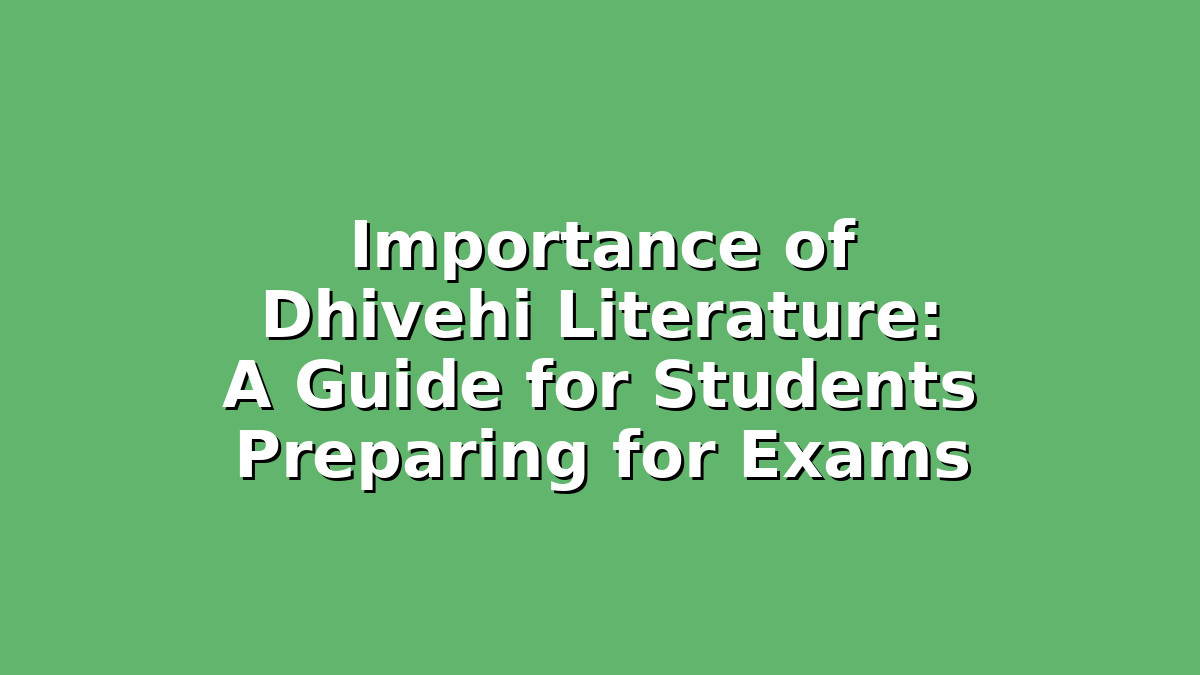As students preparing for exams, you often focus on core subjects like mathematics, science, and English. However, Dhivehi literature holds a unique and valuable place in your studies and overall cultural understanding. Embracing Dhivehi literature not only enriches your knowledge of the Maldivian language but also helps you connect deeply with your heritage, sharpen your analytical skills, and improve your exam performance. In this article, we will explore the importance of Dhivehi literature and share practical study tips to help you excel in this subject.
Understanding Dhivehi Literature and Its Significance
Dhivehi literature refers to the body of written works created in the Maldivian language, ranging from poetry, folklore, historical writings, to modern prose. This literature captures the spirit, culture, traditions, and values of the Maldives. By studying Dhivehi literature, students gain insight into the island nation’s history and social fabric, fostering a sense of identity and pride.
Moreover, Dhivehi literature often presents complex themes and expressive language that can enhance your reading comprehension and critical thinking abilities—skills that are crucial for success in any exam. Recognizing the underlying messages in literary texts improves your ability to analyze questions and articulate answers thoughtfully.
Section 1: How Studying Dhivehi Literature Enhances Language Skills
One of the key benefits of focusing on Dhivehi literature is the improvement of your language skills. When you read and study poems, stories, and plays written in Dhivehi, you expose yourself to diverse vocabulary, idiomatic expressions, and various sentence structures. This exposure helps build your linguistic proficiency, which is essential not only for Dhivehi exams but also for effective communication in everyday life.
Study tip: Create a vocabulary journal dedicated to Dhivehi literature. Whenever you encounter unfamiliar words or expressions, write them down along with their meanings and example sentences. Review this journal regularly to reinforce your learning. Practicing writing your own sentences using these new words will also make your language skills more robust.
Additionally, attempt to summarize paragraphs or explain literary passages in your own words. This habit improves both comprehension and writing fluency, making it easier to answer exam questions that require detailed explanations.
Section 2: Connecting Themes in Dhivehi Literature to Real Life for Better Retention
Dhivehi literature often reflects real-life experiences, moral lessons, and cultural beliefs. When you study these themes, try to relate them to your own life or the world around you. This connection makes the literature more meaningful and memorable.
For example, many Dhivehi poems discuss nature, human emotions, or social customs. Reflecting on how these themes apply in your daily environment can deepen your understanding and help you remember key points during exams. Also, understanding context allows you to interpret questions more accurately and provide relevant answers.
Study tip: Use mind maps to link literary themes with personal experiences or historical context. Visualizing these connections can clarify complex ideas and assist with essay planning. When you write essays or answer long questions, referencing these connections shows a deeper level of insight, which examiners appreciate.
Section 3: Effective Strategies for Excelling in Dhivehi Literature Exams
Success in Dhivehi literature exams requires more than just memorizing texts. Developing analytical and writing skills is crucial. Here are some practical strategies:
– Practice past papers: Familiarize yourself with the format and typical questions of Dhivehi literature exams. Practice answering comprehension and essay questions within a time limit to build confidence and improve time management.
– Analyze literary devices: Pay attention to poetic devices such as metaphor, simile, alliteration, and imagery. Understanding these elements allows you to interpret texts on a deeper level and support your answers with detailed evidence.
– Discuss with peers or teachers: Engaging in group discussions or seeking clarifications from teachers can provide new perspectives and clarify doubts. Explaining your interpretations aloud can also strengthen your understanding.
– Create summaries and revision notes: After studying a literary piece, write concise summaries highlighting the main ideas, characters, and themes. Use these summaries for quick revision before exams.
Study tip: Allocate regular study sessions focusing solely on Dhivehi literature. Breaking down your study into manageable chunks prevents overload and keeps your mind fresh. Consistency is key to retaining information and mastering the subject.
Conclusion
Dhivehi literature is a vital component of your academic journey and cultural education. By studying it diligently, you not only improve your language skills but also develop critical thinking and a deeper appreciation for Maldivian heritage. Remember to connect literary themes to real life, practice analytical writing, and use effective revision techniques to enhance your exam preparation.
Embrace Dhivehi literature as an opportunity to grow both intellectually and personally. With a positive mindset and strategic study habits, you can excel in this subject and carry forward the rich legacy of Maldivian culture. Good luck with your exams!

Responses